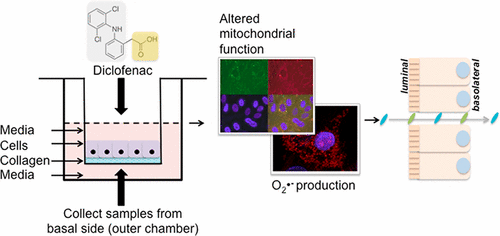当前位置:
X-MOL 学术
›
ACS Infect. Dis.
›
论文详情
Our official English website, www.x-mol.net, welcomes your feedback! (Note: you will need to create a separate account there.)
Nonsteroidal Anti-Inflammatory Drug-Induced Leaky Gut Modeled Using Polarized Monolayers of Primary Human Intestinal Epithelial Cells
ACS Infectious Diseases ( IF 5.3 ) Pub Date : 2017-11-10 00:00:00 , DOI: 10.1021/acsinfecdis.7b00139 Aadra P. Bhatt 1 , Dulan B. Gunasekara 1 , Jennifer Speer 1 , Mark I. Reed 1 , Alexis N. Peña 1 , Bentley R. Midkiff 2 , Scott T. Magness 3, 4 , Scott J. Bultman 5, 6 , Nancy L. Allbritton 1, 3, 6 , Matthew R. Redinbo 1, 6, 7
ACS Infectious Diseases ( IF 5.3 ) Pub Date : 2017-11-10 00:00:00 , DOI: 10.1021/acsinfecdis.7b00139 Aadra P. Bhatt 1 , Dulan B. Gunasekara 1 , Jennifer Speer 1 , Mark I. Reed 1 , Alexis N. Peña 1 , Bentley R. Midkiff 2 , Scott T. Magness 3, 4 , Scott J. Bultman 5, 6 , Nancy L. Allbritton 1, 3, 6 , Matthew R. Redinbo 1, 6, 7
Affiliation

|
The intestinal epithelium provides a critical barrier that separates the gut microbiota from host tissues. Nonsteroidal anti-inflammatory drugs (NSAIDs) are efficacious analgesics and antipyretics and are among the most frequently used drugs worldwide. In addition to gastric damage, NSAIDs are toxic to the intestinal epithelium, causing erosions, perforations, and longitudinal ulcers in the gut. Here, we use a unique in vitro human primary small intestinal cell monolayer system to pinpoint the intestinal consequences of NSAID treatment. We found that physiologically relevant doses of the NSAID diclofenac (DCF) are cytotoxic because they uncouple mitochondrial oxidative phosphorylation and generate reactive oxygen species. We also find that DCF induces intestinal barrier permeability, facilitating the translocation of compounds from the luminal to the basolateral side of the intestinal epithelium. The results we outline here establish the utility of this novel platform, representative of the human small intestinal epithelium, to understand NSAID toxicity, which can be applied to study multiple aspects of gut barrier function including defense against infectious pathogens and host–microbiota interactions.
中文翻译:

非甾体类抗炎药诱导的漏泄肠的建模与人类单层上皮细胞的极化单层。
肠上皮细胞提供了一个重要的屏障,可以将肠道菌群从宿主组织中分离出来。非甾体类抗炎药(NSAIDs)是有效的止痛药和退热药,并且是全球最常用的药物之一。除胃部损伤外,NSAID对肠上皮有毒性,导致肠糜烂,穿孔和纵向溃疡。在这里,我们使用独特的体外人类原发性小肠细胞单层系统可确定NSAID治疗的肠道后果。我们发现生理相关剂量的NSAID双氯芬酸(DCF)具有细胞毒性,因为它们使线粒体氧化磷酸化解偶联并产生活性氧。我们还发现DCF诱导肠屏障通透性,促进化合物从腔上移到肠上皮的基底外侧。我们在这里概述的结果建立了这个代表人类小肠上皮的新型平台的效用,以了解NSAID毒性,可将其用于研究肠道屏障功能的多个方面,包括防御传染性病原体和宿主-微生物群落的相互作用。
更新日期:2017-11-10
中文翻译:

非甾体类抗炎药诱导的漏泄肠的建模与人类单层上皮细胞的极化单层。
肠上皮细胞提供了一个重要的屏障,可以将肠道菌群从宿主组织中分离出来。非甾体类抗炎药(NSAIDs)是有效的止痛药和退热药,并且是全球最常用的药物之一。除胃部损伤外,NSAID对肠上皮有毒性,导致肠糜烂,穿孔和纵向溃疡。在这里,我们使用独特的体外人类原发性小肠细胞单层系统可确定NSAID治疗的肠道后果。我们发现生理相关剂量的NSAID双氯芬酸(DCF)具有细胞毒性,因为它们使线粒体氧化磷酸化解偶联并产生活性氧。我们还发现DCF诱导肠屏障通透性,促进化合物从腔上移到肠上皮的基底外侧。我们在这里概述的结果建立了这个代表人类小肠上皮的新型平台的效用,以了解NSAID毒性,可将其用于研究肠道屏障功能的多个方面,包括防御传染性病原体和宿主-微生物群落的相互作用。



























 京公网安备 11010802027423号
京公网安备 11010802027423号